Season 1, Episode 1: Emma Yesko (’23)
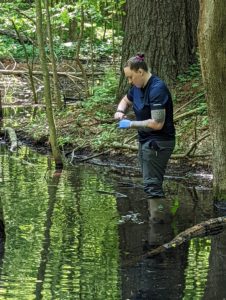 Amphibians are one of the most threatened vertebrate groups on the planet. In fact, a 2004 global assessment (by Baillie et al, 2004) found that nearly one-third of the world’s amphibians are threatened with extinction. Emerging infectious diseases, along with other factors, have been implicated in the decline of global amphibian populations. Emma Yesko (’23; Biology) a student in the lab of Dr. Matt Venesky, conducted a summer research project in which she tried to determine what caused an amphibian die-off in a pond at Allegheny College’s Bousson Environmental Research Reserve. Listen in as Emma discusses the work that she did during the summer and her plans for the future.
Amphibians are one of the most threatened vertebrate groups on the planet. In fact, a 2004 global assessment (by Baillie et al, 2004) found that nearly one-third of the world’s amphibians are threatened with extinction. Emerging infectious diseases, along with other factors, have been implicated in the decline of global amphibian populations. Emma Yesko (’23; Biology) a student in the lab of Dr. Matt Venesky, conducted a summer research project in which she tried to determine what caused an amphibian die-off in a pond at Allegheny College’s Bousson Environmental Research Reserve. Listen in as Emma discusses the work that she did during the summer and her plans for the future.
Click on Emma’s photo to listen to this episode.
Season 1, Episode 2: Bill Nese (’23)
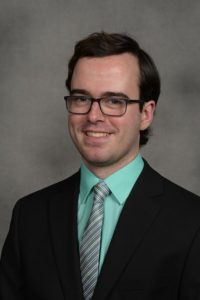 All of us are now familiar with rapid COVID antigen tests: a single line indicates no active infection whereas a double line indicates a positive infection. How do these test cards actually work and what type of chemistry is involved in this type of test? This, and numerous other biochemical and medical applications, use chemical surface reactions like those on the COVID antigen test card. One of type of surface reaction is attaching proteins to surfaces to act as a recognition system for a biosensor. Bill Nese (’23; Chemistry) a student in the lab of Dr. Alice Deckert, conducted a project in which they investigated surface reactions when a silver nanoparticle reacts with imidazole. Understanding the mechanism and rate constant for the reaction between a silver nanoparticle surface bound NHS ester and imidazole could hypothetically be determined at various concentrations of imidazole. Broadly speaking, this research allows scientists to better understand protein attachment and aid the design of numerous types of biosensors.
All of us are now familiar with rapid COVID antigen tests: a single line indicates no active infection whereas a double line indicates a positive infection. How do these test cards actually work and what type of chemistry is involved in this type of test? This, and numerous other biochemical and medical applications, use chemical surface reactions like those on the COVID antigen test card. One of type of surface reaction is attaching proteins to surfaces to act as a recognition system for a biosensor. Bill Nese (’23; Chemistry) a student in the lab of Dr. Alice Deckert, conducted a project in which they investigated surface reactions when a silver nanoparticle reacts with imidazole. Understanding the mechanism and rate constant for the reaction between a silver nanoparticle surface bound NHS ester and imidazole could hypothetically be determined at various concentrations of imidazole. Broadly speaking, this research allows scientists to better understand protein attachment and aid the design of numerous types of biosensors.
Click on Bill’s photo to listen to this episode.
Season 1, Episode 3: Victoria Smith (’23)
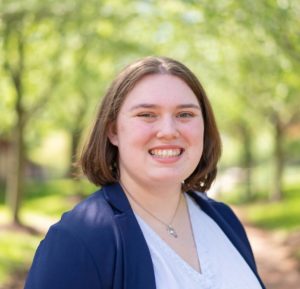 Imagine what it is like to Direct a play… as a student! In this episode, Victoria Smith (’23; Theatre and English double-major) and I chat about her experience as the Director of a play titled “It’s Not All About Sex (Or Is It?)“. This play (written by Professor Emeritus Josh Searle-White) was performed at the Meadville Community Theatre March 11-13 of 2022. The Meadville Community Theatre was founded in 1967 and is the oldest continually running community theater in Meadville. “It’s Not All About Sex (Or Is It?)” explores relationships, sexuality, and consent in our modern world. Victoria shares her thoughts on the play itself, how she got into theatre, and the coursework and preparation that goes into Directing a play [as a student]. Victoria and I also chat about the many ways in which students across all academic disciplines participate in theatre.
Imagine what it is like to Direct a play… as a student! In this episode, Victoria Smith (’23; Theatre and English double-major) and I chat about her experience as the Director of a play titled “It’s Not All About Sex (Or Is It?)“. This play (written by Professor Emeritus Josh Searle-White) was performed at the Meadville Community Theatre March 11-13 of 2022. The Meadville Community Theatre was founded in 1967 and is the oldest continually running community theater in Meadville. “It’s Not All About Sex (Or Is It?)” explores relationships, sexuality, and consent in our modern world. Victoria shares her thoughts on the play itself, how she got into theatre, and the coursework and preparation that goes into Directing a play [as a student]. Victoria and I also chat about the many ways in which students across all academic disciplines participate in theatre.
Click on Victoria’s photo to listen to this episode.
Season 1, Episode 4: Ray Colabawalla (’25) & Hunter Goerman (’25)
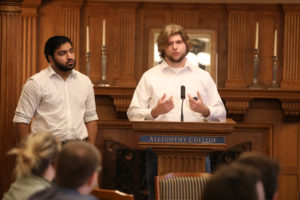 If you’re not familiar with NW Pennsylvania, this part of the country is beautiful! In fact, there are numerous natural resources and outdoor recreational areas that are within a 45-minute drive of Meadville. Ray Colabawalla (at left in the photo) and Hunter Goerman (at right in the photo) spent their summer traveling across parts of PA working on a project in conjunction with Pennsylvania Environmental Council, Dr. Ishita Roy (Dept. of Communication, Film, and Theatre at Allegheny), and local community partners trying to assess the possibility of establishing a formal connection between the large swath of public and private lands and other assets in a north-south corridor in Western Pennsylvania, between the cities of Erie and Pittsburgh. The goal of the broader project (named the “Glaciers Edge”) is to determine the feasibility of creating such linkages through the nine-county area and to boost economic development through the protection and promotion of outdoor recreational assets in this region of Pennsylvania. In this episode, Ray and Hunter chat about their summer experience and how this project would benefit the local, and regional, communities in this area.
If you’re not familiar with NW Pennsylvania, this part of the country is beautiful! In fact, there are numerous natural resources and outdoor recreational areas that are within a 45-minute drive of Meadville. Ray Colabawalla (at left in the photo) and Hunter Goerman (at right in the photo) spent their summer traveling across parts of PA working on a project in conjunction with Pennsylvania Environmental Council, Dr. Ishita Roy (Dept. of Communication, Film, and Theatre at Allegheny), and local community partners trying to assess the possibility of establishing a formal connection between the large swath of public and private lands and other assets in a north-south corridor in Western Pennsylvania, between the cities of Erie and Pittsburgh. The goal of the broader project (named the “Glaciers Edge”) is to determine the feasibility of creating such linkages through the nine-county area and to boost economic development through the protection and promotion of outdoor recreational assets in this region of Pennsylvania. In this episode, Ray and Hunter chat about their summer experience and how this project would benefit the local, and regional, communities in this area.
Click on Ray and Hunter’s photo to listen to this episode.
Season 1, Episode 5: Michael Gartland (’23)
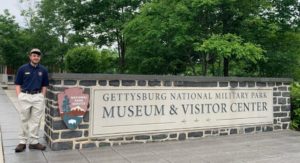 The Battle of Gettysburg was one of the most influential battles within the American Civil War — it marked the turning point of the war and ended Confederate general Robert E. Lee’s attempt to invade the North and eliminating the possibility that the Confederate States of America would become an independent nation with the Union victory. Michael Gartland (’23), a History major and English minor, spent part of the Summer of 2022 as an intern at the Gettysburg National Military Park and worked on a research project in which he used an online database to find and catalogue over 200 soldier pension files over the summer to provide information about the lives of Union soldiers that died during the three days of the Battle of Gettysburg and were buried in the cemetery. The ultimate goal of the project, which was part of a larger archival digitization project, was to begin a database that catalogued these soldiers so that Rangers could use these stories for future Anniversary weekends and other events.
The Battle of Gettysburg was one of the most influential battles within the American Civil War — it marked the turning point of the war and ended Confederate general Robert E. Lee’s attempt to invade the North and eliminating the possibility that the Confederate States of America would become an independent nation with the Union victory. Michael Gartland (’23), a History major and English minor, spent part of the Summer of 2022 as an intern at the Gettysburg National Military Park and worked on a research project in which he used an online database to find and catalogue over 200 soldier pension files over the summer to provide information about the lives of Union soldiers that died during the three days of the Battle of Gettysburg and were buried in the cemetery. The ultimate goal of the project, which was part of a larger archival digitization project, was to begin a database that catalogued these soldiers so that Rangers could use these stories for future Anniversary weekends and other events.
Click on Michael’s photo to listen to this episode.
Season 1, Episode 6: Rachel Walters (’23)
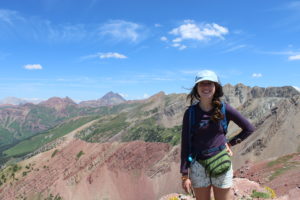 The plants and animals that inhabit most ecosystems experience phenological changes (i.e., cyclical and seasonal changes in their physiology, anatomy, or behavior). In fact, those of us who live in the temperate zone are familiar with a common phenological change: watching the leaves of deciduous trees change colors and drop during autumn. Climate change is altering the timing and patterns of precipitation and temperature and these changes can have profound effects on the phenology of organisms. In this episode, I chat with Rachel Walters (’23; Biology) who participated in a summer research project at the Rocky Mountain Biological Laboratory in Colorado with Dr. Lee (Mick) Demi, Assistant Professor in the Department of Environmental Sciences and Sustainability. Listen in to hear Rachel talk about how she spent her summer in the high-elevation streams of Colorado studying climate-induced changes in river phenology.
The plants and animals that inhabit most ecosystems experience phenological changes (i.e., cyclical and seasonal changes in their physiology, anatomy, or behavior). In fact, those of us who live in the temperate zone are familiar with a common phenological change: watching the leaves of deciduous trees change colors and drop during autumn. Climate change is altering the timing and patterns of precipitation and temperature and these changes can have profound effects on the phenology of organisms. In this episode, I chat with Rachel Walters (’23; Biology) who participated in a summer research project at the Rocky Mountain Biological Laboratory in Colorado with Dr. Lee (Mick) Demi, Assistant Professor in the Department of Environmental Sciences and Sustainability. Listen in to hear Rachel talk about how she spent her summer in the high-elevation streams of Colorado studying climate-induced changes in river phenology.
Click on Rachel’s photo to listen to this episode.
Season 1, Episode 7: Evelyn Griffith (’24)
 Evelyn Griffith (’24) is a double major in Computer Science and English Creative Writing and also a soprano vocalist at Allegheny College. In November of 2022, Evelyn performed a Junior Vocal Recital (one of many possible Performance Opportunities for Allegheny Students through our Music Department) in the Ford Memorial Chapel. Prior to her recital, I had the opportunity to sit down and chat with Evelyn about a number of topics ranging from singing as a child to what it means to be a student vocalist. In addition to our conversation, I had the chance to sit in and record one of her practices prior to the recital. Listen in to hear our conversation and clips of Evelyn singing. You don’t want to miss this one!
Evelyn Griffith (’24) is a double major in Computer Science and English Creative Writing and also a soprano vocalist at Allegheny College. In November of 2022, Evelyn performed a Junior Vocal Recital (one of many possible Performance Opportunities for Allegheny Students through our Music Department) in the Ford Memorial Chapel. Prior to her recital, I had the opportunity to sit down and chat with Evelyn about a number of topics ranging from singing as a child to what it means to be a student vocalist. In addition to our conversation, I had the chance to sit in and record one of her practices prior to the recital. Listen in to hear our conversation and clips of Evelyn singing. You don’t want to miss this one!
Click on Evelyn’s photo to listen to this episode.
Season 1, Episode 8: Lottie Mateyak (’23)
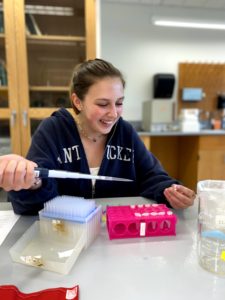 Glucocorticoids are steroid hormones that occur naturally in vertebrates and they regulate many aspects of an organisms physiology. They are also widely used for the treatment of inflammation, autoimmune diseases, and even in some cancers. In this episode, I chat with Lottie Mateyak (’23; Biology) about a research project that she conducted with Dr. Mahita Kadmiel, Assistant Professor in the Biology Department at Allegheny College. The big aim of the project is to understand how researchers can use glucocorticoids as part of the treatment of eye diseases but minimize the negative side effects that glucocorticoid use can have. Listen in as Lottie discusses her work with retinal cells and glucocorticoids during her summer research experience at Allegheny.
Glucocorticoids are steroid hormones that occur naturally in vertebrates and they regulate many aspects of an organisms physiology. They are also widely used for the treatment of inflammation, autoimmune diseases, and even in some cancers. In this episode, I chat with Lottie Mateyak (’23; Biology) about a research project that she conducted with Dr. Mahita Kadmiel, Assistant Professor in the Biology Department at Allegheny College. The big aim of the project is to understand how researchers can use glucocorticoids as part of the treatment of eye diseases but minimize the negative side effects that glucocorticoid use can have. Listen in as Lottie discusses her work with retinal cells and glucocorticoids during her summer research experience at Allegheny.
Click on Lottie’s photo to listen to this episode.
Season 1, Episode 9: Haley Fabich (’24) & Erin Magnus (’23)
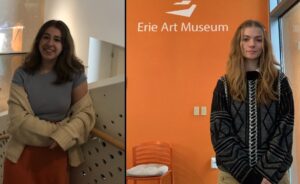 The Art Department at Allegheny College has a rich tradition of helping students learn to contextualize artworks, understand the connection between art and history, and showcasing original pieces of art in the Allegheny Art Galleries. Allegheny students and faculty also have opportunities to collaborate with art galleries and museums in the surrounding area during which students gain valuable exposure to regional artists and can assist in local art exhibitions. In this episode, I chat with Haley Fabich (L) and Erin Magnus (R) about their involvement in some projects and internships at the Erie Art Museum.
The Art Department at Allegheny College has a rich tradition of helping students learn to contextualize artworks, understand the connection between art and history, and showcasing original pieces of art in the Allegheny Art Galleries. Allegheny students and faculty also have opportunities to collaborate with art galleries and museums in the surrounding area during which students gain valuable exposure to regional artists and can assist in local art exhibitions. In this episode, I chat with Haley Fabich (L) and Erin Magnus (R) about their involvement in some projects and internships at the Erie Art Museum.
Click on Haley and Erin’s photo to listen to his episode.
Season 1, Episode 10: Skyler Masse (’23) and Emily Spitz (’23)
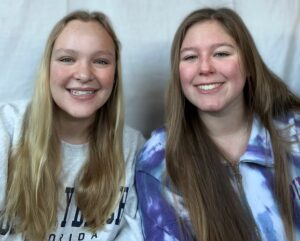 For a number of years, Dr. Becky Dawson (’00) has partnered with the Meadville Medical Center on a number of projects associated with public health and epidemiology. One of these projects has been assisting in the Crawford County Health Needs Assessment. This is an ongoing research project aimed to assess the health in Crawford County by collecting, analyzing, distributing and using valid and reliable quantitative and qualitative data to improve community health. During the Summer of 2022, Skyler Masse (Biology) and Emily Spitz (Biochemistry) were part of a team of students that worked with Dr. Dawson on this, and other, projects. Listen in to hear about the work that Skyler and Emily did on this project!
For a number of years, Dr. Becky Dawson (’00) has partnered with the Meadville Medical Center on a number of projects associated with public health and epidemiology. One of these projects has been assisting in the Crawford County Health Needs Assessment. This is an ongoing research project aimed to assess the health in Crawford County by collecting, analyzing, distributing and using valid and reliable quantitative and qualitative data to improve community health. During the Summer of 2022, Skyler Masse (Biology) and Emily Spitz (Biochemistry) were part of a team of students that worked with Dr. Dawson on this, and other, projects. Listen in to hear about the work that Skyler and Emily did on this project!
Click on Skyler and Emily’s photo to listen to this episode.